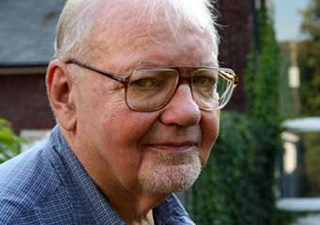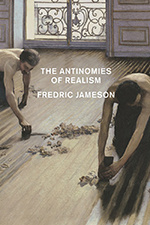The Antinomies of Realism, written by Fredric Jameson and published by Verso, is the winner of the 2014 Truman Capote Award for Literary Criticism in Memory of Newton Arvin.

The $30,000 award—the largest annual cash prize in English-language literary criticism—is administered for the Truman Capote Estate by the University of Iowa Writers' Workshop.
Jameson, the William A. Lane Jr. Professor of Comparative Literature and Professor of Romance Studies at Duke University, will accept the award this fall in a public event at the UI that will include remarks on the literary topic of his choosing.
The Writers' Workshop is a graduate program in the UI College of Liberal Arts and Sciences and the Graduate College. Explore the writing programs at the UI at www.writinguniversity.org. And learn about the activities of Iowa City as a UNESCO City of Literature at cityofliteratureusa.org.
Jameson received a Ph.D. from Yale in 1959 and taught at Harvard, Yale, and the University of California before going to Duke in 1985. He is the author of Postmodernism, or, The Cultural Logic of Late Capitalism (1991, which won the MLA Lowell Award), Seeds of Time (1994), Brecht and Method (1998), The Cultural Turn (1998), and A Singular Modernity (2002). His recent works include Archaeologies of the Future (2005) and The Modernist Papers (2007). He received the 2008 Holberg Prize for his scholarship.
The book was chosen by an international panel of prominent critics and writers—Terry Castle, Garrett Stewart, Michael Wood, John Kerrigan, Elaine Scarry, and Joyce Carol Oates—each of whom nominated two books. Books of general literary criticism in English, published during the last four years, are eligible for nomination. After reading all the nominated books, each critic ranked the nominees.

The Antinomies of Realism is a history of the 19th-century realist novel and its legacy told without a glimmer of nostalgia for artistic achievements that the movement of history makes it impossible to recreate. Jameson examines the most influential theories of artistic and literary realism, approaching the subject himself in terms of the social and historical preconditions for realism’s emergence. The realist novel combined an attention to the body and its states of feeling with a focus on the quest for individual realization within the confines of history.
Robert Eaglestone writes in Times Higher Education, “…a book that so manifestly displays Jameson’s many virtues as a truly great critic… It is not always easy to read the work of someone who just won’t sit on his laurels: but in this case it is worth it.” Michael Wood writes in London Review of Books, “Admirable… Jameson thinks dialectically in the strong sense, in the way we are all supposed to think but almost no one does.”
And Princeton University’s Hal Fosters says, “This latest installment in his epic ‘poetics of social form’ is vintage Jameson: no other critic has his range of reference in literature and theory, and no one dialecticizes their connections to politics and history with anything like his transformative energy. Not since Auerbach has ‘realism’ been so penetratingly analyzed or so radically rethought. With many surprises along the way—such as the new centrality Jameson affords ‘affect’ in the realist novel—the results are absolutely stunning.”
The Truman Capote Estate announced the establishment of the Truman Capote Literary Trust in 1994, during a breakfast at Tiffany's in New York City, on the 40th anniversary of the publication of Capote’s novella Breakfast at Tiffany's.
Past winners of the Capote Award include British scholar P.N. Furbank; Helen Vendler of Harvard University; John Felstiner of Stanford University; John Kerrigan of Cambridge University; pianist/scholar Charles Rosen of the University of Chicago; Elaine Scarry and Philip Fisher of Harvard University; Malcolm Bowie of Oxford University; Declan Kiberd of University College, Dublin; Irish Nobel Laureate Seamus Heaney; Susan Stewart of Princeton University; Angus Fletcher of the City University of New York Graduate School; Geoffrey Hartman of Yale University; William Gass of Washington University in St. Louis; Helen Small of Pembroke College, Oxford University; Geoffrey Hill of Boston University; Seth Lerer of the University of California at San Diego; Mark McGurl of the University of California at Los Angeles; Elaine Showalter of Princeton University; and Marina Warner of the University of Essex.
The establishment of the Truman Capote Literary Trust was stipulated in the author’s will, and the Annual Truman Capote Award for Literary Criticism in Memory of Newton Arvin reflects Capote's frequently expressed concern for the health of literary criticism in the English language. The awards are designed to reward and encourage excellence in the field.
Newton Arvin, in whose memory the award was established, was one of the critics Capote admired. However, Arvin's academic career at Smith College was destroyed in the late 1940s when his homosexuality was exposed.